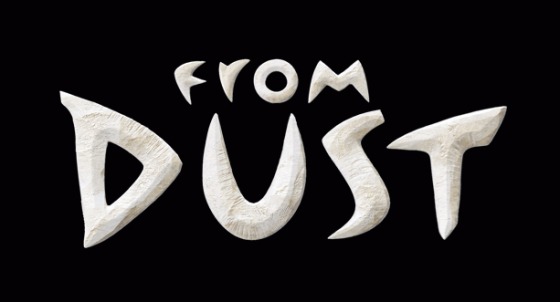
I must admit, titles where the player is given the powers of a God and asked to shape the world how he or she sees fit were never compelling to me, regardless of how incredible the premise sounds. In what feels like the first game in which I play the part of the Almighty since I've become a mature gamer, I decided to give From Dust a Godly go of it. Does its foundation hold up to the heavy expectations heaped upon it, or is this one wiped away by a tsunami?
Overview
From Dust places the player in control of "the breath", which is more or less the hand of God. As the breath, it is your task to lead your nomadic tribe from point A to point B and everywhere in between. They are in search of the wisdom and elemental power of the ancients. You are in search of a way of keeping these dudes from getting themselves killed.
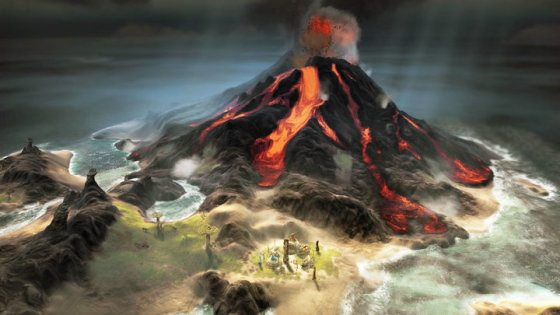
Gameplay
It's kind of like Lemmings, with funky white masks and less humor. Let me just say that is partial sarcasm before anyone jumps down my throat. You set a destination for the men to walk, and the game automatically decides how many men to send to the objective. One of the major drawbacks of the title is that your destination can only be an interactive object or totem. Each stage has multiple totems, which 5 men must traverse to in order to erect a village. Once the village is built, you can send one man in search of trinkets to ward off the elemental hazards of the world. Since you cannot set midway destinations or plot exact paths, the men have a penchant for taking the worst possible detours. Avoiding this requires careful attention to your men - so you can stop them before they walk into the path of oncoming lava - as well as split-second decisions - so you can build a land-bridge before an overflowing lake carves a river between your people and their target. This can be both tricky and frustrating, but also very enjoyable when it works as it should.
As the breath, you're limited to creation and destruction in the loosest possible sense; pretty much carrying resources around. Each stage is already exists when your tribe enters the field. It's like a literal sandbox, with the goal being to create a sand city for hermit crabs to pass through. The breath can scoop up most any material that the world is composed of: earth, lava, or water, with the only exception being rock. Earth is conducive to creating habitable areas and growing vegetation, which helps to further unlock memories of the tribe (think From Dust specific Wikipedia articles). Lava, when cooled, forms rock to create new land, bridges, river trenches, and walls for impeding the impending tsunami. Because tsunamis happen quite often. Water quenches the fires you've undoubtedly set to the forests and your villages with the lava you MEANT to build walls with. You cannot advance until you've built a village on each of the fields totems. Fortunately, capturing a totem affords the breath new powers: amplify breath increases carrying capacity, jellify water stops deluges in their place, evaporate water combats flooding, and so on. These powers are timed and are on cooldown, so there is some strategy on how to successfully implement them during play.
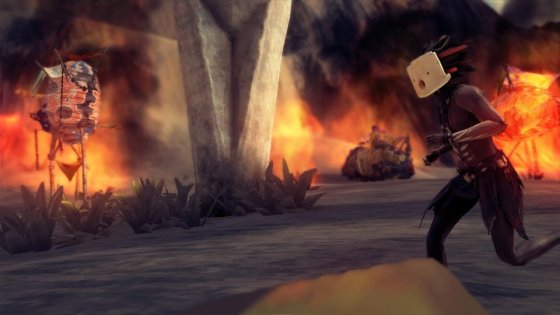 Accidental arson. Every. Damn. Time.
Accidental arson. Every. Damn. Time.
The difficulty of the maps tend to range on the trickier side of the spectrum, each requiring some thought and planning to complete successfully. There are 13 stages in the story, 12 of which are mostly moving bits of the Earth around. It isn't until the final stage that you have the true powers of a God, with the ability to create anything in the world as you see fit. Lava, mountains, sand, tidal waves, vegetation; whatever you've previously encountered, you will be able to control in that last scenario. This stage's awesomeness is only surpassed by its tardiness. Once you've completed the story, you can tackle challenge maps that are unlocked by meeting certain goals during the story. These maps are less open than those found during the campaign, as you have a clear defined goal and obstacles that you must overcome in the fastest possible time for leaderboard flaunting. I think I enjoyed these more than the story's map.
Art Design
One of the most impressive elements of From Dust is its sheer graphical brilliance. Playing is akin to watching a National Geographic special in HD; the world is rendered with true life beauty, as is everything that exists within. The physics are like poetry in motion, my favorite being the viscous fluidity of a ball of lava as it is being gathered by the breath. The flow of water, the dispersion of soil, the breaking of a tsunami as it clashes against a village protected by a warding relic. It all looks as brilliant as it would if we were to witness these things occurring before our eyes.
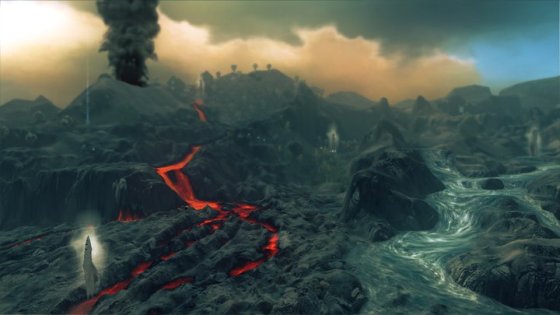
My one nitpick here would be that regardless of how much detail was put into the graphics and physics, when you closely inspect the men in movement, there is strange interaction between them and the environment. They walk through vegetation as if it is nothing but an illusion. It also would have been nice to see different animations for the the men as they traverse different heights and terrains. This is mostly a non-issue for me, as I played mostly from the wide overhead view, but the same can't be said for all gamers. That said, I did find myself wishing there was another camera option between the close crop and far wide views. In a game where you must be aware of the transpirings across the whole map, the tight view is good only in bursts. The wide view is great, but being that high above the world really limits what you can see of the men, and even how you hear the world below you.
Sound Design
As mentioned above, I preferred playing with a wide view of the field, which muted most of the world's ambient sound. It's a bit disappointing, especially since most of what's going on sounds so damn good. The build up of a massive tidal wave, the crackling of molten rock as it flows out of an erupted volcano, the songs of the men's wards of protection all sound as lovely as the world is beautiful. Unfortunately, most of this is mitigated if you plan on seeing the action from a God's true perspective.
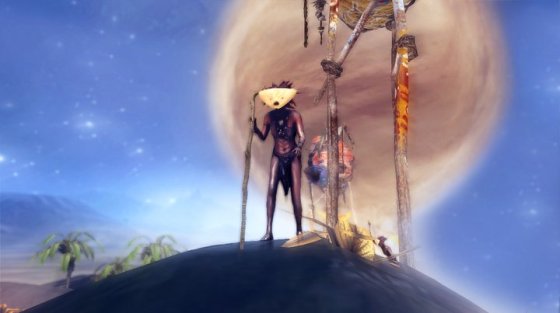
Conclusion
From Dust is a balanced offering from Ubisoft Monpellier and Eric Chahi, which seems to have as many strengths as it does weaknesses. With limited replay factor outside of the challenge maps, and at a $15 equivalent price point, I hope Ubisoft has some free DLC in the pipes where the player is offered true God-like control of the world, much like the final episode of the story.
Buy it: if you've always wanted to play God to a tribe of Nomads
Don't buy it: if you don't plan on spending some time exploring the details of the world
The Score: 7 outta 10 Blasters!